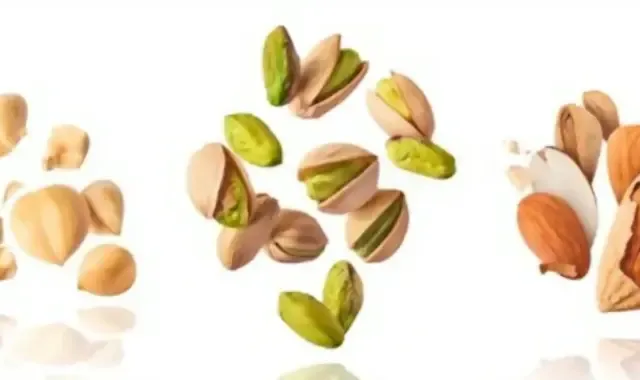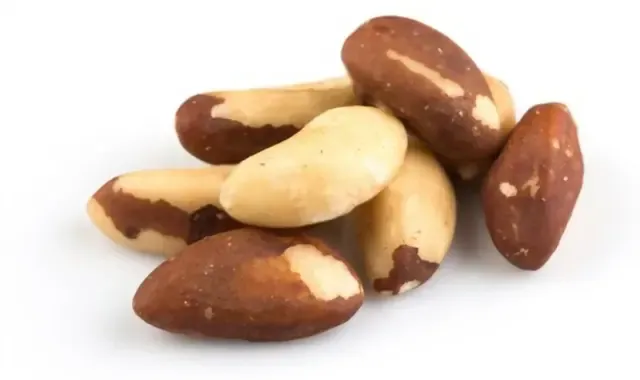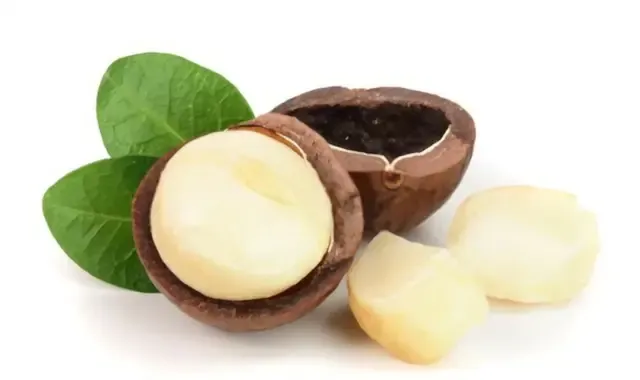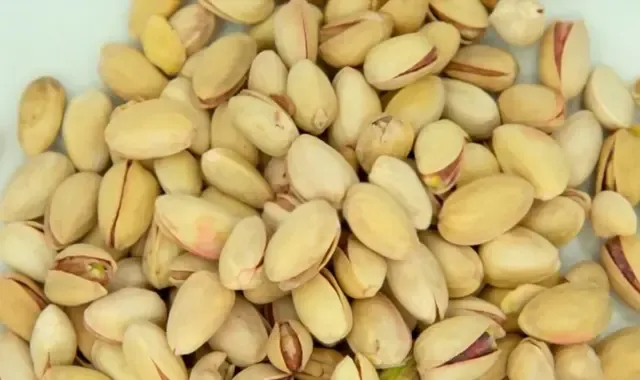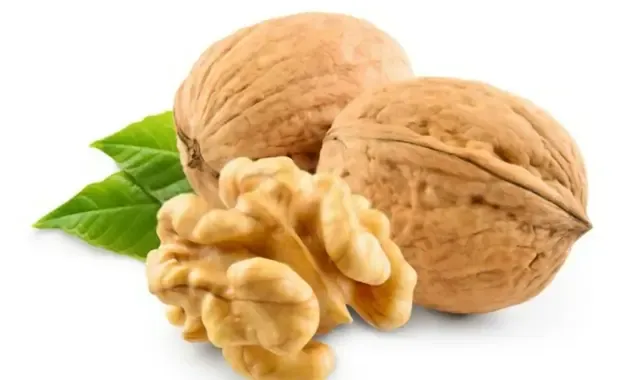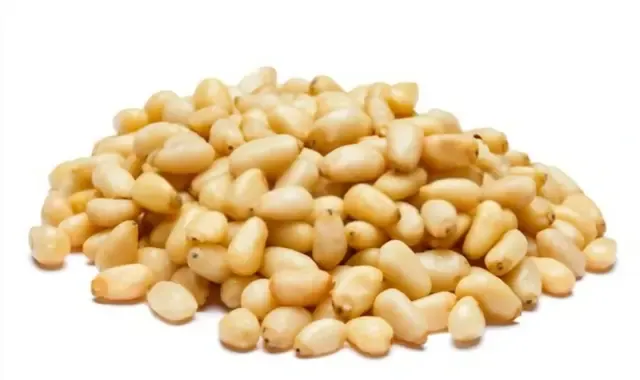Nuts are good for your beauty, they slow the aging process. Also, they have been proven in numerous studies to provide a variety of health advantages, particularly in terms of lowering heart disease risk factors.
But are they really the healthiest nuts generally all nuts are good sources of healthy.
Nuts are a nutritious snack, they contain no cholesterol and are rich in omega-3 fatty acids.
Even though they are often heavy in fat, the fat they contain is of a healthy kind, they also have a high content of fiber and fats protein fiber many different vitamins minerals, and antioxidants, and they provide us with much-needed energy and other benefits.
Nuts can support your heart by helping to lower bad cholesterol and increase good cholesterol whatever type of nuts you choose they're a super portable and versatile food.
So, you should eat them to prevent various diseases.
You are free to enjoy different kinds of nuts whenever you want.
Here are 10 super-healthy picks to load up on, from almonds and beyond.
1. Amonds
There is a reason almonds get so much health hype.
In addition to being a solid source of fiber and protein, almonds have also been shown to help lower inflammation in the body and help you maintain a healthy weight.
(some of those inflammation benefits may stem from the fact that almonds are high in vitamin E, one serving provides 60 percent of your daily needs!).
Some research has even linked eating almonds with a decreased risk of developing colon cancer.
Just note that a one-ounce serving of almonds comes out to about 24 nuts, so keep an eye on your portions.
Per 1-ounce serving: 164 calories, 14 g fat (1 g sat fat), 6 g carbs, 1 g sugar, 3.5 g fiber, 6 g protein.
2. Brazil Nuts
These nuts pack in plenty of selenium, a mineral involved in thyroid hormone production and that's crucial in antioxidant function for processes that protect us against cancer, " says dietician Kelly R. Jones, RD.
It's also great for hair skin and nail health.
One study even showed an immediate impact on blood cholesterol improvements within nine hours of ingestion.
You only need to eat two or three a day to get the benefits, So do not eat a whole handful of them like you would almonds.
Per 1-ounce serving: 187 calories, 19 g fat (4.5g sat fat), 3g carbs, 0 g sugar, 2 g fiber, 4 g protein.
3. Cashews
Cashews have more iron than any other nut.
With iron being the most common nutrient deficiency, more people should include them in their diets.
The creamy texture of cashews also makes them a great dairy replacement.
Try using ground salted cashews as a substitute for Parmesan.
Per 1-ounce serving: 160 calories 12 g fat (2 g sat fat), 9g carbs, 1g sugar, 2g fiber, 5g protein.
4. Macadamia Nuts
Generally associated with cookies, macadamias are highly underrated.
Macadamia nuts are high in thiamin (a.k.a. Vitamin B1), manganese, and copper, and contain healthy monounsaturated fat, the kind found in avocados and olive oil.
They are also great in salads or as a more nutritious coating for chicken or fish.
Per 1-ounce serving: 204 calories, 21g fat (0g sat fat), 3.9g carbs, 1g sugar, 2g fiber, 2.4g protein.
5. Peanuts
Peanuts, though actually not a nut at all, but rather part of the legume family, are a good source of protein and many different Vitamins and minerals, such as magnesium and phosphorus.
Yes, you can reap their benefits by eating peanut butter but try not to go at the jar with a spoon.
Keep in mind that peanut butter is high in calories, so stick to the serving size of two tablespoons.
Per 1-ounce serving: 161 calories, 0.4 g fat (0 g sat fat), 4.5 g carbs, 1g sugar, 2g fiber, 7g protein.
6. Pistachios
These little green gems make a great snack or salad topper because of their high nutrient and antioxidant content.
They're one of the nuts with the highest concentration of the antioxidants lutein and zeaxanthin, both of which promote eye health.
Even better: Behavioral research has shown that it takes you longer to de-shell pistachios, so you are likely to eat less of them.
Per 1-ounce serving: 159 calories, 12.8 g fat (0 g sat fat), 7.7 g carbs, 2.1 g sugar, 3 g fiber, 5.7 g protein.
7. Walnuts
Walnuts are a super plant source of omega-3 fatty acids, which are essential in our diet and help to reduce the risk of heart disease.
Though they are a little higher in calories and fat than other nuts, they contain healthy fat that the body needs (and which helps you stay fuller for longer).
Add walnuts to banana bread or oatmeal, or snack on 'em plain.
Per 1-ounce serving: 220 calories, 22 g fat (0 g sat fat), 5 g carbs, 1 g sugar, 2 g fiber, 5 g protein.
8. Pecans
Pecans are one of the best-known dietary sources of Vitamine E, they are also a great source of thiamin, a B vitamin that plays a key role in energy metabolism.
You can use them in yogurt oatmeal, soups, veggie sides, and more.
Fall is the perfect time to sprinkle them on just about everything.
Per 1-ounce serving: 196 calories, 20 g fat (0 g sat fat), 3 g carbs, 1 g sugar, 2 g fiber, 2.6 g protein.
9. Pine Nuts
Pine nuts are a good source of vitamins E and K, as well as iron and magnesium.
Iron, which is essential for oxygen transportation throughout the body, is especially important for vegetarians, who may fall short on the mineral without meat in their diet.
Pine nuts contain nearly eight grams of iron per cup, so they are a great source of the mineral.
Use pine nuts to make pesto or sprinkle them on top of pasta, salads, chicken, or fish for a healthy crunch.
Per 1-ounce serving: 190 calories, 19 g fat (1.5 g sat fat), 0 mg sodium, 4 g carbs, 1 g sugar, 1g fiber, 4g protein.
10. Hazelnuts
In addition to tasting delish in Nutella, hazelnuts are a good source of vitamin E, copper, manganese, and antioxidants.
Their antioxidants have even been shown to help decrease cholesterol and inflammation.
Enjoy hazelnuts as a snack, or add toasted hazelnuts to veggie dishes, salads, and pasta.
Just be sure to keep the skin on, since it contains the highest concentration of antioxidants, or skip the store-bought stuff and make your own hazelnut spread at home with hazelnuts, cocoa, and a touch of sweetener.
Per 1-ounce serving: 178 calories, 17g fat (1.3g sat fat), 0mg sodium, 4.7 g carbs, 1.2 g sugar, 2.8 g fiber, 4.2 g protein.
Quick and Easy Healthy Recipes with Nuts
Here are some recipes for preparing some quick and tasty treats with nuts:
Peanuts with Honey
Ingredients:
For this dessert you need:
- 450 gr peanuts
- 250 ml honey
- 2 tablespoons butter
- 1/4 cup sugar
- Salt
- Vanilla extract, and cinnamon
Directions:
- Bake the peanuts at 160C and prepare a baking pan lined with oiled aluminum foil.
- Mix butter, honey, vanilla, cinnamon, and a pinch of salt.
- Melt all that by streaming.
- Add peanuts and mix well.- Such coated peanuts spread on the prepared pan, and bake them for - 20 minutes, but with mixing every 5 minutes.
- When golden brown, remove them from the oven and stir occasionally until cool.
- After two minutes, sprinkle them with sugar.
Walnuts with Lemon and Orange.
You need:
- 3 cups of nuts
- 4 tablespoons of orange juice
- 1 tablespoon of honey
- 1.5 cups of sugar
- 1/4 cup freshly grated orange rind
- 1 teaspoon of freshly grated lemon zest, and 1/4 cup of lukewarm water
- Mix water, honey, juice, and sugar in a bowl and place in the cooker at medium temperature.
- Stir until the sugar melts.
- Leave on the oven until it reaches a temperature of 115C.
- Remove and add peels and nuts, and mix well.
- Get them to the prepared casserole. Allow to completely cool and harden.
Nuts are an excellent addition to a healthy diet due to their numerous health benefits.
They are rich in healthy fats, fiber, protein, vitamins, minerals, and antioxidants. Incorporating a variety of nuts into your diet can provide you with essential nutrients and energy while reducing the risk of various diseases.
Almonds, Brazil nuts, cashews, macadamia nuts, peanuts, pistachios, walnuts, pecans, pine nuts, and hazelnuts are among the healthiest nuts recommended by nutritionists.
Each type offers unique nutritional advantages, such as vitamin E, selenium, iron, omega-3 fatty acids, and various other vitamins and minerals.
Furthermore, consuming nuts can support heart health by lowering bad cholesterol and increasing good cholesterol levels.
They also aid in reducing inflammation, promoting weight management, and improving overall well-being.
It's important to note that portion control is key, as nuts are calorie-dense.
Moderation is advised to avoid excess calorie intake. Incorporating nuts into your diet can be done through various creative ways, such as adding them to salads, oatmeal, and yogurt, or using them as a substitute in recipes.
In summary, incorporating a variety of nuts into your diet can provide you with numerous health benefits.
Enjoying them in moderation as part of a balanced diet is an easy and delicious way to support your overall health and well-being. So go ahead and enjoy the wide range of flavors and nutritional benefits that nuts have to offer!
FAQs
Q: What are the health benefits of eating nuts?
Nuts offer numerous health benefits as they are rich in healthy fats, fiber, protein, vitamins, minerals, and antioxidants.
They can support heart health, reduce inflammation, aid in weight management, and provide essential nutrients to the body.
Q: Which nuts are considered the healthiest?
According to nutritionists, some of the healthiest nuts include almonds, Brazil nuts, cashews, macadamia nuts, peanuts, pistachios, walnuts, pecans, pine nuts, and hazelnuts.
Each type of nut offers unique nutritional advantages and can contribute to overall well-being.
Q: How can nuts benefit heart health?
Nuts can support heart health by helping to lower bad cholesterol levels and increase good cholesterol levels.
Incorporating nuts into a balanced diet can reduce the risk of heart disease and promote cardiovascular well-being.
Q: Are nuts high in calories?
While nuts are nutrient-dense and contain healthy fats, they are also high in calories.
It's important to practice portion control when consuming nuts to avoid excessive calorie intake. Moderation is key to enjoying the health benefits of nuts without overconsuming calories.
Q: How can I incorporate nuts into my diet?
There are various creative ways to incorporate nuts into your diet.
You can add them to salads, oatmeal, and yogurt, or use them as a substitute in recipes.
They can also be enjoyed as a snack on their own. Exploring different flavors and combinations can make incorporating nuts into your diet both delicious and nutritious.
Q: Can nuts help with weight management?
Yes, nuts can aid in weight management. Despite their calorie content, the healthy fats, protein, and fiber in nuts can help you feel fuller for longer, reducing cravings and overeating.
Including nuts as part of a balanced diet can contribute to maintaining a healthy weight.
Q: Are there any specific nutrients found in different types of nuts?
Yes, different types of nuts offer specific nutrients. For example, almonds are high in vitamin E and help lower inflammation.
Brazil nuts are a good source of selenium and support hair, skin, and nail health.
Cashews contain more iron than other nuts and provide a creamy texture as a dairy replacement. Each nut has its own unique nutrient profile.
Q: Are there any precautions or allergies to consider when consuming nuts?
Some individuals may have allergies to nuts, so it's important to be aware of any allergies or sensitivities before consuming them.
If you have nut allergies, it's essential to avoid them completely. Additionally, portion control is advised due to their calorie density.
Q: Can nuts be part of a vegetarian or vegan diet?
Absolutely! Nuts are a great source of protein, healthy fats, and various vitamins and minerals, making them an excellent addition to vegetarian or vegan diets.
They provide essential nutrients that may otherwise be lacking in plant-based diets.
Q: Can nuts be enjoyed by people of all ages?
Yes, nuts can be enjoyed by people of all ages. However, it's important to consider age-appropriate portion sizes and any specific dietary restrictions or allergies.
For young children, it's essential to ensure nuts are given in a safe and appropriate form to prevent choking hazards.

